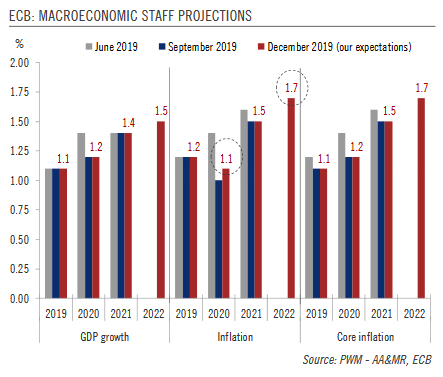Summary:
Macroeconomy With leading economies likely facing double-digit declines in GDP in Q1 and Q2, we expect Brent oil in the USD10–20 range in Q2 before reaching a long-term equilibrium of USD18 at year’s end. With consumers tempted to remain cautious, the oil sector in deep difficulty and a big rise in unemployment, we expect dire Q2 GDP figures for the US. We have reduced our GDP forecast for 2020 as a whole to -7.7%. Likewise, we expect the biggest hit to euro area growth to occur in Q2, and are now pencilling in full-year GDP growth of -9.5%. Dragged down by weak external demand, we see the Chinese recovery being gradual and uneven. We expect 1.2% GDP growth in China this year. As business surveys reveal the impact of the coronavirus, we have revised down
Topics:
Perspectives Pictet considers the following as important: 2.) Pictet Macro Analysis, 2) Swiss and European Macro, Featured, newsletter, Pictet
This could be interesting, too:
Macroeconomy With leading economies likely facing double-digit declines in GDP in Q1 and Q2, we expect Brent oil in the USD10–20 range in Q2 before reaching a long-term equilibrium of USD18 at year’s end. With consumers tempted to remain cautious, the oil sector in deep difficulty and a big rise in unemployment, we expect dire Q2 GDP figures for the US. We have reduced our GDP forecast for 2020 as a whole to -7.7%. Likewise, we expect the biggest hit to euro area growth to occur in Q2, and are now pencilling in full-year GDP growth of -9.5%. Dragged down by weak external demand, we see the Chinese recovery being gradual and uneven. We expect 1.2% GDP growth in China this year. As business surveys reveal the impact of the coronavirus, we have revised down
Topics:
Perspectives Pictet considers the following as important: 2.) Pictet Macro Analysis, 2) Swiss and European Macro, Featured, newsletter, Pictet
This could be interesting, too:
investrends.ch writes Die Schweiz an der Schwelle zur digitalen Transformation der Fondsindustrie
investrends.ch writes Pictet setzt bei neuem Hedgefonds auf KI
Nachrichten Ticker - www.finanzen.ch writes Die Performance der Kryptowährungen in KW 9: Das hat sich bei Bitcoin, Ether & Co. getan
Nachrichten Ticker - www.finanzen.ch writes Wer verbirgt sich hinter der Ethereum-Technologie?

Macroeconomy
- With leading economies likely facing double-digit declines in GDP in Q1 and Q2, we expect Brent oil in the USD10–20 range in Q2 before reaching a long-term equilibrium of USD18 at year’s end.
- With consumers tempted to remain cautious, the oil sector in deep difficulty and a big rise in unemployment, we expect dire Q2 GDP figures for the US. We have reduced our GDP forecast for 2020 as a whole to -7.7%. Likewise, we expect the biggest hit to euro area growth to occur in Q2, and are now pencilling in full-year GDP growth of -9.5%.
- Dragged down by weak external demand, we see the Chinese recovery being gradual and uneven. We expect 1.2% GDP growth in China this year. As business surveys reveal the impact of the coronavirus, we have revised down again our 2020 forecast for Japan to -5.8%.
Currencies
- We have downgraded our conviction on the euro versus US dollar to take account of lingering stress in global markets. We remain neutral on emerging-market currencies versus the dollar overall, but with a preference for defensive Asian (ex Japan) currencies from countries with healthy current account balances and currency reserves as well as sustainable debt loads.
Asset Allocation
- We remain tactically underweight equities, while we have decided to move our stance on US equities up and our stance on their euro area peers down. Cherished themes are ‘e-everything’, healthcare and biotech, with a clear preference for unregulated over regulated industries. Overall, however, we consider equity valuations elevated.
- We remain neutral US Treasuries which, despite the prospect of massive bond issuance, continue to protect portfolios, whereas we have a negative stance on core euro, Swiss and Japanese bonds because of negative yields. We still prefer short-duration, quality (investment-grade) corporate bonds to high yield. While we have shifted down our stance on the euro versus the US dollar to neutral, our preference goes to defensive currencies, as well as gold.
Equities
- Supported by low government bond yields, markets rebounded in April. Overall however,, the market revival has been narrowly based and price-earnings in some areas like consumer discretionary are above the lows of previous recessions. Analysts have been trimming their earnings forecasts for this year, but the rebound next year is expected to be stronger in the US. Along with the tech theme, this has led us to change our stance to neutral US equities and underweight euro area ones. Our focus on structural growers continues to stand us to good stead.
- Emerging-market (EM) equities trailed in the recent market rebound. While relatively cheap, we believe we will need to see pick-up in the global economy before EM equities perform again in any sustainable way. We are not there yet.
Alternatives
- Private-equity deals will likely be difficult to complete in the coming months. The impact of the virus outbreak on investment performance will depend on the deployment rate – the higher the deployment, the more serious the impact.
Fixed Income
- We remain neutral on euro peripheral sovereign bonds, with our central scenario for spreads over Bunds to tighten gradually by year’s end, conditional on an adequate pan-euro recovery plan.
- We believe the default rate in the US high-yield market could rise to 15% by end-2020, and even higher in the energy sector. As we continue to assess the value offered by widening credit spreads, we remain underweight US high yield.
Tags: Featured,newsletter,Pictet








